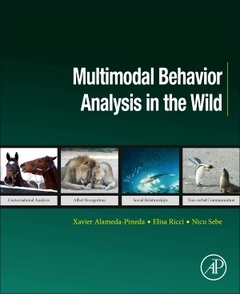Multimodal Behavior Analysis in the Wild Advances and Challenges Computer Vision and Pattern Recognition Series
Coordonnateurs : Alameda-Pineda Xavier, Ricci Elisa, Sebe Nicu

Multimodal Behavioral Analysis in the Wild: Advances and Challenges presents the state-of- the-art in behavioral signal processing using different data modalities, with a special focus on identifying the strengths and limitations of current technologies. The book focuses on audio and video modalities, while also emphasizing emerging modalities, such as accelerometer or proximity data. It covers tasks at different levels of complexity, from low level (speaker detection, sensorimotor links, source separation), through middle level (conversational group detection, addresser and addressee identification), and high level (personality and emotion recognition), providing insights on how to exploit inter-level and intra-level links.
This is a valuable resource on the state-of-the- art and future research challenges of multi-modal behavioral analysis in the wild. It is suitable for researchers and graduate students in the fields of computer vision, audio processing, pattern recognition, machine learning and social signal processing.
1. Multimodal open-domain conversations with robotic platforms 2. Audio-motor integration for robot audition 3. Audio source separation into the wild 4. Designing audio-visual tools to support multisensory disabilities 5. Audio-visual learning for body-worn cameras 6. Activity recognition from visual lifelogs: State of the art and future challenges 7. Lifelog retrieval for memory stimulation of people with memory impairment 8. Integrating signals for reasoning about visitors’ behavior in cultural heritage 9. Wearable systems for improving tourist experience 10. Recognizing social relationships from an egocentric vision perspective 11. Complex conversational scene analysis using wearable sensors 12. Detecting conversational groups in images using clustering games 13. We are less free than how we think: Regular patterns in nonverbal communication 14. Crowd behavior analysis from fixed and moving cameras 15. Towards multi-modality invariance: A study in visual representation 16. Sentiment concept embedding for visual affect recognition 17. Video-based emotion recognition in the wild 18. Real-world automatic continuous affect recognition from audiovisual signals 19. Affective facial computing: Generalizability across domains 20. Automatic recognition of self-reported and perceived emotions
Elisa Ricci is a researcher at FBK and an assistant professor at University of Perugia. She received her PhD from the University of Perugia in 2008. She has since been a postdoctoral researcher at Idiap and FBK, Trento and a visiting researcher at University of Bristol. Her research interests are directed along developing machine learning algorithms for video scene analysis, human behaviour understanding and multimedia content analysis. She is area chair of ACM MM 2016 and of ECCV 2016. She received the IBM Best Student Paper Award at ICPR 2014.
Nicu Sebe is a full professor at the University of Trento, Italy, where he is leading the research in the areas of multimedia information retrieval and human behavior understanding. He was a general co-chair of FG 2008 and ACM MM 2013, and a program chair of CIVR 2007 and 2010, of ACM MM 2007 and 2011, and of ECCV 2016. He is a program chair of ICCV 2017 and of ICPR 2020, and a general chair of ICMR 2017. He is a senior member of IEEE and ACM and a fellow of IAPR.
- Gives a comprehensive collection of information on the state-of-the-art, limitations, and challenges associated with extracting behavioral cues from real-world scenarios
- Presents numerous applications on how different behavioral cues have been successfully extracted from different data sources
- Provides a wide variety of methodologies used to extract behavioral cues from multi-modal data
Date de parution : 11-2018
Ouvrage de 498 p.
19x23.3 cm
Thèmes de Multimodal Behavior Analysis in the Wild :
Mots-clés :
Activity recognition; Affective computing; Audio guide; Audio–motor integration; Audio-visual processing; Automatic emotion recognition; CNN; Computer vision; Constructive dialog model; Content-based image retrieval; Context awareness; Cultural heritage; Data collection; Deep learning; Dictionary learning; Ecological validity; Egocentric vision; Ego-noise reduction; Emotion perception; Event segmentation; Human behavior analysis; Human–robot interaction; Image retrieval; Lifelogging; Mild cognitive impairment; Mobile computing; Multichannel; Multimodal communication; Multimodal data; Museum visitors guide; Object detection; Open-domain dialogs; Person identification; Personalized social behavior modeling; Real world conditions; Realistic conditions; Robot audition; Self-report; SIFT; Single-channel; Social behavior analysis; Social signal processing; Sound localization; Visual lifelogs; Wearable cameras



